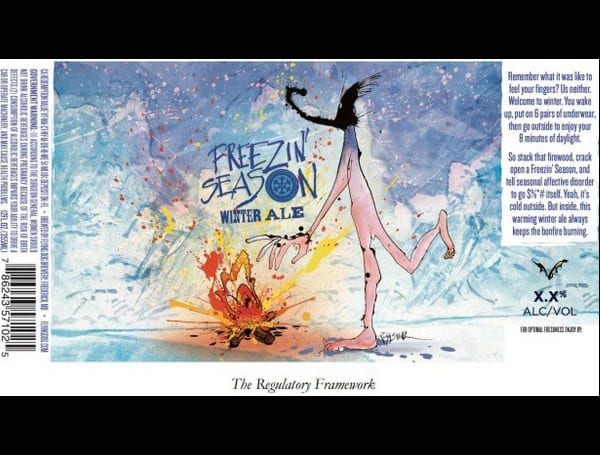In contemporary America, a tussle over free speech can happen almost anywhere.
In North Carolina, it’s occurring on a beer bottle.
The Maryland-based Flying Dog Brewery is making a literal federal case out of Tarheel State regulators denying sales of one of its brews because of the design of its label.
At issue is Flying Dog’s art for its “Freezin’ Season” Winter Ale.
Lawyers for the brewery suggest in court records that the image is a benign “silhouette of a cartoon figure standing next to a campfire.”
The company had submitted it to regulators with the North Carolina Alcohol Beverage Control [ABC] Board in July for approval.
Instead of a simple “silhouette,” the ABC Board saw something else.
To them, the image reportedly shows a naked man standing beside that campfire, against what could be the backdrop for the movie “Frozen.”
They denied the design.
The company says in its court filing that the ABC Board tossed the design under state regulations that prohibit advertising considered “undignified, immodest, or in bad taste.” The state agency made its point by highlighting the phrase “bad taste.” “As you can see the image below is seen as inappropriate to many here,” the board told Flying Dog.
Yet, as the brewery argues, bad taste is also constitutionally protected.
Accordingly, the company sued.
CEO Jim Caruso said in a statement that the legal action is “about defending the First Amendment against petty bureaucrats who want to censor whatever they personally dislike.”
“Does anyone really want to live in a country where government bureaucrats can censor material based on whim and personal preference? Books? Music lyrics? Videos streamed in the privacy of your own home? News stories?” Caruso said.
In court records, Flying Dog argues, “Given that the label was rejected, Plaintiff Flying Dog Brewery is unable to market, sell, and distribute Freezin’ Season in North Carolina, and it is unable to engage in the right of free expression guaranteed to it by the First Amendment to the U.S. Constitution.”
Additionally, the company maintains that “bad taste” is too subjective and arbitrary a standard to withstand constitutional scrutiny.
On one more point, Flying Dog notes that the artist who does its labels is Ralph Steadman, who collaborated with renowned journalist Hunter S. Thompson, a friend of Flying Dog’s founder, George Stranahan.
“Steadman is renowned for expressing social and political commentary through his art,” the company notes, in furthering its First Amendment argument. “Flying Dog Brewery’s labels have expressive components with detailed and humorous artwork that is not limited solely to promoting its products.”
The case was set to go before a judge on Thursday. Flying Dog had requested an injunction on the state’s decision. The decision is unclear at this time.
On the company’s website, it notes, “We live in a world where people are coddled, messages are muddled and ideas are squashed in the name of political correctness. When the Thought Police closed in on us, we went to Federal court to defend our right to free speech and expression.”
In 1995, its label was rejected by Colorado alcohol regulators because Steadman had penned on it the phrase “good beer, no s–t.”
In 2009, Michigan authorities snubbed a label for a Flying Dog beer dubbed “Raging B—h.”
In both cases, Flying Dog prevailed.
Above the paragraph recalling its legal brawls, Flying Dog offers a three-word declaration: “And f–k censorship.”
Support journalism by clicking here to our gofundme or sign up for our free newsletter by clicking here
Android Users, Click Here To Download The Free Press App And Never Miss A Story. It’s Free And Coming To Apple Users Soon.

